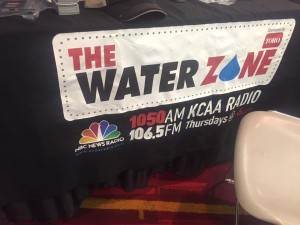Oregon Association of Nurseries
When it comes to water issues, the Oregon Association of Nurseries is very active and involved, OAN Executive Director Jeff Stone said.
Stone was a guest on the Water Zone talk radio program last week, which originates in Loma Linda, California. He gave the nursery industry perspective on irrigation issues, explaining that it’s an issue the nursery industry must watch very closely.
“Drought is a significant (issue),” Stone said. “You wouldn’t think it would be in Oregon, but 25 of our 36 counties in 2015 were in moderate to severe drought. The big problem is that precipitation is not falling as snow and the snowpack isn’t as big. And so when you have precipitation falling as rain and there’s not adequate infrastructure to capture that rain and have enough storage, we have to think about infrastructure a little differently.”
The weekly show is devoted solely to water issues is produced by KCAA radio. The station is based in the greater Inland Empire region of California, east of Los Angeles, where drought issues have been critical for the last several years.
“Oregon has not suffered as much as much as the state of California, but we can certainly learn a lot of the lessons that you’ve learned,” Stone said. “And trying to convince agriculture execs that climate change is real has been a challenge.”
Stone mentioned that the Oregon Association of Nurseries has been very involved in water issues in Oregon.
“We are firmly involved in a lot of infrastructure debate,” Stone said. “Oregon just in 2013 passed its first water supply infrastructure bill and that was out of reaction to a multitude of issues that we find ourselves in.”
He mentioned that the emergence of a cannabis industry in Oregon also has an effect on Oregon nurseries, especially in terms of water and pesticide issues.
“One of the biggest concerns that I have, and I’m sure that California will find the same, is that the whole cannabis industry is not used to acting in the light, and so they are high water use, high energy use,” he said. “And the fact is that, they are using pesticides and not being concerned about runoff or the impact that it has on their product. These are things that are vexing because legislators don’t necessarily want to know the details. All they know is when things go wrong, they want to open up ag practices, which impacts our growers.”
The show can be heard at http://podcasts.kcaastreaming.com/water. Click on the December 8 show. It can be listened to through the site, or it can be downloaded and listened to on most audio management programs, such as iTunes. Stone’s segment on the show begins at the 47 minute mark and lasts until the end of the hourlong program.
Last week’s Water Zone emanated from Las Vegas. Stone was in town as an invited speaker for the national Irrigiation Association’s 2016 Drought Summit, which was taking place there. He spoke as part of a panel on “Perspectives on Drought and Water Management.”
Panelists were there representing the states of Nevada, Oregon, California and Arizona, and the West in general. Stone was the only agriculture representative on the panel.
Issues of drought and water management were recently covered in depth in the November 2016 Water Issue of Digger.
Disclaimer: Articles featured on Oregon Report are the creation, responsibility and opinion of the authoring individual or organization which is featured at the top of every article.

